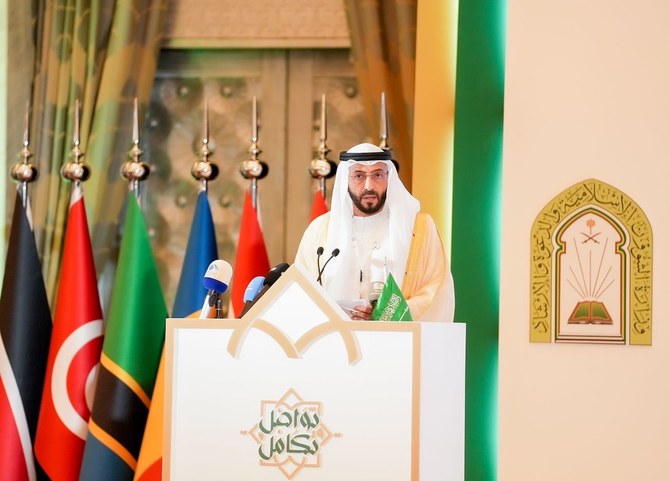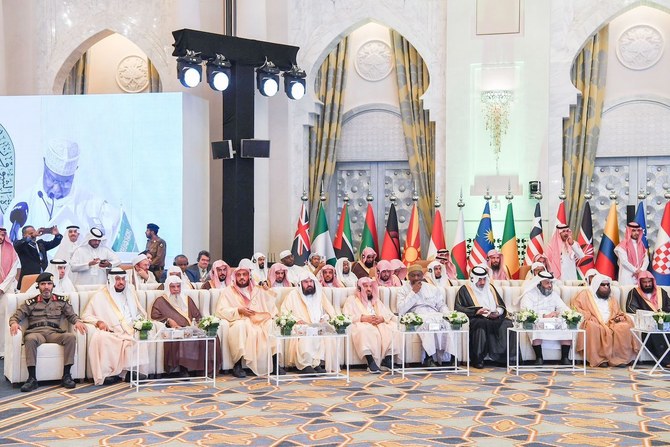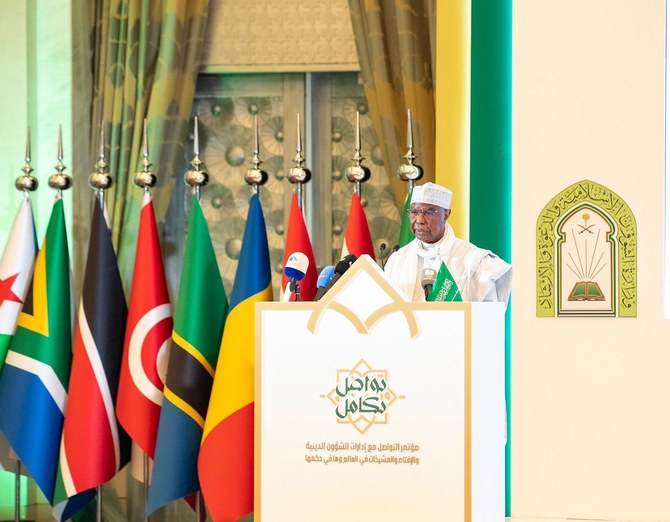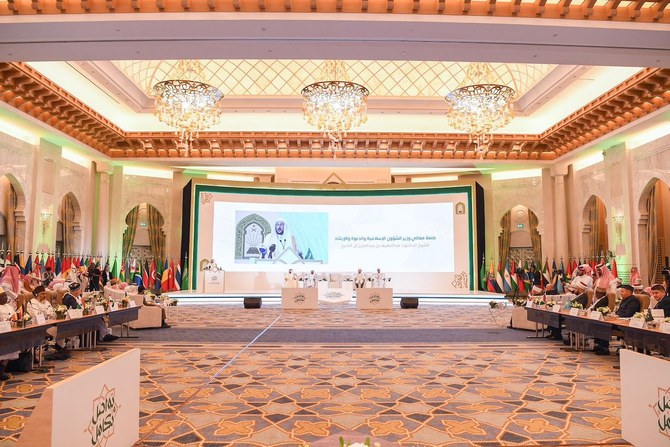MAKKAH: The international conference, “Communication with the Departments of Religious Affairs, Ifta and Sheikhdoms in the World,” was organized in Makkah on Sunday.
Held under the theme “communication and integration,” the two-day conference will be attended by about 150 leading Islamic scholars, muftis, religious leaders and thinkers from 85 countries.
Heads of Islamic associations and sheikhdoms, as well as academics from a number of international universities, are also taking part in the event, organized by the Saudi Ministry of Islamic Affairs, Dawah and Guidance.
The conference is sending a message to the world about Saudi efforts to serve Islam and Muslims, and to promote the values of moderation.
Saudi Islamic Minister Sheikh Abdullatif Al-Asheikh said that the conference was a continuation of the Kingdom’s efforts to promote moderation, a key principle of true Islam. Its objective was to advance the Kingdom’s mission of fostering unity among Muslims and combating terrorism and extremism. The ultimate goal was to “establish peace, stability, and prosperity in Islamic countries and globally.”
Al-Asheikh said: “We are meeting in this conference, which embodies Islamic unity and underlines cooperation, partnership, and solidarity, which constitute a great prophetic approach. The conference is initiated in this blessed country, which has adopted this principle since its founding, and carries the pure message of Islam.
“It also spreads the principles of justice, mercy, and moderation in an authentic approach that has become an example to follow in calling out to God according to the approach adopted by the Qur’an and the Sunnah of the Prophet and being introduced to the nation’s predecessors. This approach combines authenticity and modernity, preserves constants, and adopts variables in a manner that achieves religious and worldly interests.”
Al-Asheikh added that under the leadership, the people of the Kingdom were experiencing a global renaissance. Despite this progress, they remained deeply religious and upheld Islamic values. They were also inviting the world to embrace this approach, which promotes goodness, mercy, the call to Islam, moderation, and rejects extremism and decadence.
He emphasized the urgent need to meet, consult, and cooperate based on righteousness and fear of God in order to uphold the Islamic approach. This was necessary due to the increasing intensity of violence and extremist ideologies, as well as the adoption of corrupt practices that go against the tolerance and justice of Islam. Additionally, the “politicization of Islamic groups in an attempt to achieve partisan goals, even at the expense of true religious values, is a concerning trend. It is crucial to distance ourselves from this falsehood and extremism and embrace a moderate understanding of religious discourse.”
Hissein Brahim Taha, secretary-general of the Organization of Islamic Cooperation, said that the Kingdom had become a destination for peaceful coexistence and human values, given its humanitarian and civilized heritage and assets, as its leaders were concerned with promoting concepts between religions.
“Saudi leaders have greatly supported OIC in all fields to be able to achieve its mission to the fullest. This conference is held amid burdensome challenges that the Islamic world is facing, in addition to geopolitical developments, ideological challenges, and aggressive tendencies aiming to distort the image of Islam.
“We are required to stand firm against these tendencies and hostile currents and to evoke the concept of Islamic unity, which is known to be a civilized, cultural, and human unity based on cooperation, cohesion, interaction, and enrichment of human civilization in all fields.”
Taha emphasized the need to establish a comprehensive Islamic platform, encompassing countries, governments, and institutions. “This platform should prioritize consensus, dialogue, and strengthening relations within the Islamic nation. It should also promote peace, brotherhood, and solidarity, while upholding the principles of Islam and defending its authenticity.”
Nauryzbai kazhy Taganuly, the mufti of Kazakhstan, stressed the importance of “issuing new fatwas accommodating to different realities, which would launch initiatives and fatwas capable of adapting in all aspects of life.”
He also referred to the recurrence of the actions of burning the Holy Qur’an in many European countries, which angered the Islamic world. He said that those who had committed this extremist act should be condemned.
Dr. Mohammed Matar Al-Kaabi, chairman of the Emirati General Authority of Islamic Affairs and Endowments, stated that at the conference, “we come together to share concerns, ideas and experiences.
“The aim is to cooperate in launching initiatives, overcoming challenges, setting priorities, and agreeing on strategies that serve Islam and Muslims,” he said.
“This conference is held amid tough and specific challenges in the world, which are overtaking the system of human values which were called for by the divine messages and unanimously approved by sound minds as well as correct education curricula, the most important of which is faith education,” he said.
Al-Kaabi highlighted the challenges faced by the system, including currents that reject the existence of a Creator, mock religions, and incite rebellion against divine principles. He also mentioned the threats to family values, such as attempts to redefine marriage and disregard innate characteristics. These challenges pose a risk to the innocence of children, values, and the future of humanity.
“The values of moderation and tolerance are being exposed to conceptual and behavioral challenges posed by political Islam currents, which take over sophisticated Islamic concepts and interpret religious texts in an extremist way to brainwash their followers, incite them to violence and terrorism, and invite them to bully others,” he said.
Ahmed Al-Murabit Al-Shinqiti, the grand mufti of Mauritania, said: “The Saudi leaders have always been keen to serve Islam and Muslims in various fields of Islamic work all around the world.”
He highlighted that the conference addressed the urgent needs of the entire Islamic nation, calling for the confrontation of complex modern issues. It emphasized the “importance of finding solutions and understanding the significance and relevance of Islamic law, rules, and purposes in relation to reality.”
































